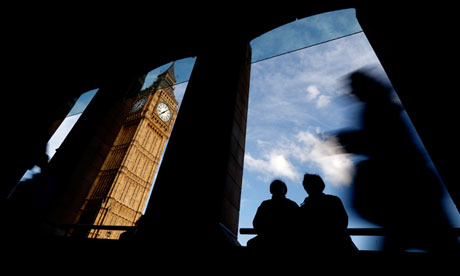
The opening of Louise Doughty‘s last novel, Whatever You Love, was brutal and unexpected – a woman opens her door to a pair of police officers who inform her that her daughter has been killed in a road accident. The beginning of the present book is no less surprising, though the brutality comes later.
Yvonne Carmichael, an eminent geneticist in her early 50s, has been called upon to give evidence to a parliamentary select committee. On her way out she catches the eye of a well-groomed man with an authoritative air and peculiar access to the House of Commons’s most secluded nooks and crannies. Within a few pages he has secured the key to the crypt chapel, where they have hasty, euphoric sex.
It may be a risky ploy for a novel that wants to be taken seriously to flirt with the market-conquering strain of submissive female erotica. As the prose ponders “the delicate electricity” of skin against skin, or the salacious sensation of becoming “nothing but mouth”, it does rather look as if Doughty is intent on painting the 51st shade of grey. But the narrative recovers its composure with an astute evocation of the awkward, sticky aftermath: “I make my way across the chapel floor, dishevelled and hobbling … You fetch one of the chairs for me and sit me down, like a paramedic seating a road crash victim.”
As the first-person narrator, Yvonne, is at pains to point out, the episode is a complete aberration. But we also know from the first page where everything will lead, as Doughty includes a prologue in which her protagonist is cross-examined in the dock of the Old Bailey as an accessory to murder. It’s an audacious ploy, combining the tease of a psychological thriller with the inexorability of a predetermined conclusion; but Doughty’s achievement is to imagine a horribly mundane tragedy – the kind that could happen to anyone, but a tragedy nonetheless.
Like all tragic figures, Yvonne has a lot to lose. She is happily married to a fellow research scientist with two grown-up children and an esteemed academic record: “I am fifty-two. I have status and gravitas – when I don’t have my tights round my ankles in a secluded chapel beneath the Houses of Parliament, that is.” Yet the analytical part of her mind cannot help but try to determine the significance of the anomaly: “In science we accept aberrations. It is only when aberrations keep happening that we stop and try and look for a pattern.”
Inevitably, a pattern does begin to form. Yvonne finds herself thinking obsessively about her anonymous lover (whose name we do not learn until almost 300 pages later), confiding to her computer in the small hours of the morning while her husband sleeps downstairs. The ultimate tool of betrayal – a separate, pay-as-you-go phone – is acquired. Further trysts occur in dimly lit alleys and disabled toilets, while the old excuse that nobody need know and nobody will be hurt is applied; until the plot takes a viciously unexpected swerve.
The details of Yvonne’s crime and conviction are best left for the reader to savour. But it gives nothing away to state that the comprehensiveness of her public disgrace is harrowingly well-realised. Doughty observes the hot, stifling humiliation of the holding cells beneath the Old Bailey, where defendants sit sweating in numbered plastic bibs. And the trial itself is a masterful piece of evasion and selective disclosure, as the true nature of Yvonne’s relationship with the accused has to be kept secret even from her own defence team: “I see myself reflected in the jury’s eyes and it is like looking in a fairground mirror distorting me almost but not entirely beyond recognition. Three decades of being the most respectable science professional or suburban mother count for nothing set against one fuck in a doorway.”
Doughty inevitably draws upon the dramatic irony of a geneticist condemned by her own field of research: “DNA made me and DNA undid me. DNA is God … one of the few discoveries of mankind that mean there’s no point in being a liar.” But she also uses the model of the genome to explain how the small, consoling fictions we tell ourselves build up into complex patterns of deceit: “It is human nature to let people think that we are something more glamorous than we are. I let you believe that I am one of the nation’s top geneticists, when actually I am a moderately successful scientist coasting on past research.”
Yvonne’s indiscretion beneath the Houses of Parliament grows into a compelling cautionary tale of what happens when fantasy begins to occlude real life. “The trouble with stories is, they are addictive,” Doughty states. In this case, she may never have written a truer word.

